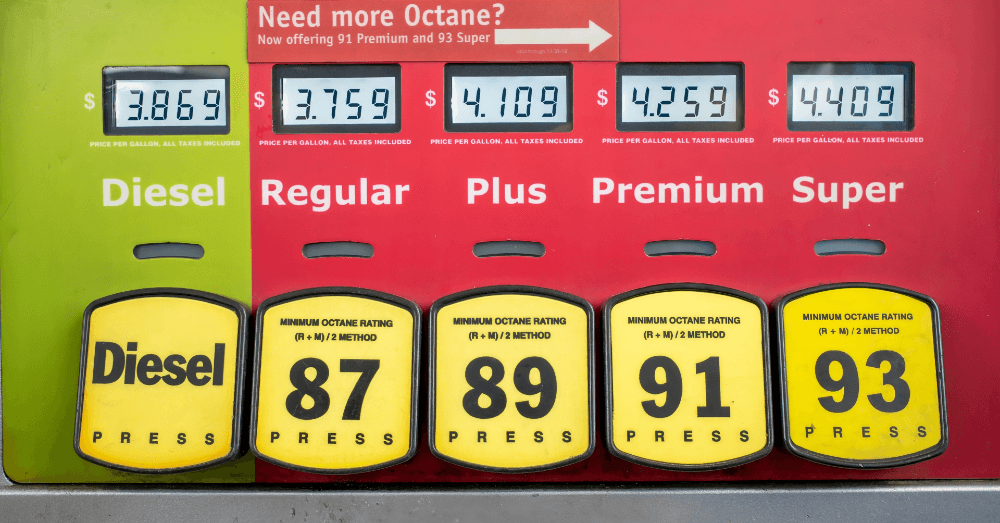Should you fill your car with premium gas, or will regular fuel do the trick? This is a question that many have to answer when driving regular cars.
You would think the most common vehicles on the market would only require regular 87-octane fuel, but that’s not always the case. It’s also important to note that you don’t have to use premium gas in most vehicles. Typically, if an engine operates at higher compressions, it should be operated using higher-octane fuel. You can still find some performance benefits when using better fuel in your vehicle.
Key takeaways
- Premium gas may enhance performance in high-performance engines, but it isn’t necessarily more fuel efficient
- Use the fuel type recommended by your car’s manufacturer for best performance
- Using higher-octane fuel in an engine designed for regular fuel only wastes money and may cause issues
What are the differences between premium and regular fuel?
Regular fuel, which is the most common and widely used, has an 87-octane rating. This fuel is what most drivers use, and it’s perfectly fine for most vehicles. In fact, when most people discuss gas prices, they are referring to regular fuel, not higher-octane versions. Premium fuel has an octane rating of 91 or higher. Typically, when you discuss premium, it refers to fuel that is 93-octane, leaving the 91-octane fuel to be the midgrade fuel.
A higher octane rating means the fuel is better balanced and stabilized against spontaneous combustion, which can cause knocking and damage to a car engine. Premium fuel may also contain additional, higher-quality additives compared to regular gas. Premium fuel is not necessary to improve efficiency for cars that are designed to use regular fuel.
Does higher octane gas improve efficiency?
Some think premium gas lasts longer or provides better efficiency figures, but that’s not the case. Any efficiency gained using premium fuel would stem from the engine performance, not the gas. This is especially the case in standard engines that aren’t designed to run on premium. Using premium can decrease emissions and make an engine more resistant to knocking, but it’s meant for vehicles with turbochargers or high-compression engines, making it easier to hit the top horsepower figures smoothly.
Which gas should you use?
If you’re unsure which fuel to put in your gas tank, check the owner’s manual. If the manual states you should use regular 87-octane fuel, there’s no reason to buy more expensive, higher-octane fuel. When you do this, you’re literally flushing money down your gas tank. Using higher-octane fuel in an engine designed for it helps protect the engine, but using this fuel in an engine made for regular fuel offers no benefits.
91 or 93?
If your vehicle requires premium gas, you need to know the minimum octane rating for your car, Typically, you can find this rating listed on the inside o the fuel door and in the owner’s manual. Some cars require at least 91 octane fuel while others state you must use 93 octane fuel to operate the vehicle correctly and protect the engine parts.
Recommend vs. require
When the owner’s manual recommends premium gas, you can typically operate the vehicle safely on regular gas. You might not reach the performance and fuel economy figures quoted by the manufacturer by using regular gas, but you’ll still be fine handling most of your driving duties and needs while saving money over using premium fuel. Of course, if you want to push your car hard or are planning a track day, you’ll want to use premium fuel for higher-intensity driving situations.
Can you mix premium and regular fuel?
Most drivers don’t drive until the gas tank is completely empty, which means you’re always mixing brands of fuel, but if you use the same octane every time, you probably don’t think about it. On the other hand, if you’ve been driving on regular fuel and then suddenly switch to premium gas, will this be an issue? It’s perfectly fine to mix types of gas, and you won’t have any issues with the performance caused by going from one fuel grade to another.
Don’t get sucked into putting higher-grade fuel in your tank because your car has been making a funny noise or seems sluggish. These issues aren’t typically indicators of fuel problems but other engine performance problems. Using premium gas should be reserved for when you need to use higher-grade fuel and it’s required, not as a mythical answer to your engine issues. Don’t waste money on the higher-grade fuel when you don’t need it.
